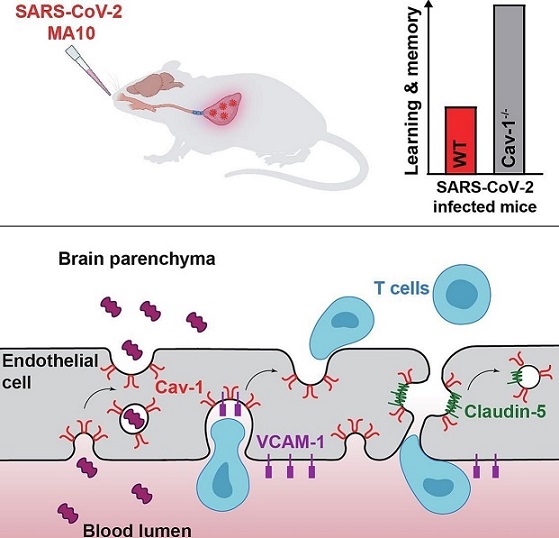Illinois Study Finds That Caveolin-1 Mediates Blood-Brain Barrier Permeability, Neuroinflammation And Cognitive Impairment In COVID-19
Nikhil Prasad Fact checked by:Thailand Medical News Team Feb 04, 2024 1 year, 2 months, 3 weeks, 18 hours, 50 minutes ago
COVID-19 News: The COVID-19 pandemic has presented an array of challenges and complexities, not the least of which is the impact on the neurological system. Emerging research covered in this
COVID-19 News report, from the University of Illinois at Chicago College of Medicine sheds light on a critical aspect of this puzzle - the role of Caveolin-1 (Cav-1) in mediating blood-brain barrier (BBB) permeability and its subsequent effects on neuroinflammation and cognitive impairment.
 Caveolin-1 Mediates Blood-Brain Barrier Permeability, Neuroinflammation And Cognitive Impairment In COVID-19
Understanding BBB Permeability and Neurological Outcomes
Caveolin-1 Mediates Blood-Brain Barrier Permeability, Neuroinflammation And Cognitive Impairment In COVID-19
Understanding BBB Permeability and Neurological Outcomes
The blood-brain barrier, a crucial regulator of cerebrovascular permeability, can be disrupted in respiratory viral infections, leading to neuroinflammation and cognitive impairment. The study employed Cav-1-deficient mice to investigate how this protein influences BBB permeability, neuroinflammation, and cognitive function in the context of a respiratory infection with a mouse-adapted SARS-CoV-2 strain.
Key Findings
The research revealed that SARS-CoV-2 infection increased the expression of Cav-1 in brain endothelial cells, resulting in heightened transcellular BBB permeability to albumin, a decrease in paracellular BBB Claudin-5 tight junctions, and T lymphocyte infiltration in the hippocampus - a region crucial for learning and memory. Consistently, the infected mice exhibited learning and memory deficits.
Crucial Role of Caveolin-1
Cav-1, a multifaceted regulator, was identified as a key player in BBB permeability. The protein is involved in various aspects, including transcellular transcytosis, modification of paracellular permeability, and influencing leukocyte adhesion molecule distribution. The study demonstrated that genetic deficiency in Cav-1 mitigated the transcellular BBB permeability, tight junction losses, T lymphocyte infiltration, and cognitive deficits induced by SARS-CoV-2 infection.
Cav-1 and Cognitive Impairment
The study focused on the hippocampus, given its significance in cognition, and found that Cav-1 upregulation during SARS-CoV-2 infection contributed to BBB permeability changes, neuroinflammation, and subsequent cognitive impairment. Importantly, mice lacking Cav-1 were protected from these adverse effects, highlighting the potential therapeutic implications of targeting Cav-1 in COVID-19-related neurological complications.
Insights into COVID-19 Neurological Impairment
Disorders of cognition are prevalent in COVID-19, with neuroinflammation and BBB permeability being notable features in both patients and animal models. The hippocampus, a vulnerable target in COVID-19, undergoes atrophy correlating with cognitive decline post-infection. This study adds depth to the understanding of how BBB permeability, mediated by Cav-1, contributes to neuroinflammation and cognitive impairment in COVID-19.
rong>Cav-1 Mechanisms Unveiled
The study delved into the intricate mechanisms through which Cav-1 operates. It demonstrated Cav-1's involvement in endocytosis, transcytosis, and modifying paracellular permeability, providing a comprehensive view of how Cav-1 influences endothelial cell function. Notably, the upregulation of Cav-1 in forebrains of COVID-19 decedents underscores its potential role in the neuropathological processes associated with the disease.
Utilizing SARS-CoV-2 MA10 Model
The researchers employed a mouse-adapted SARS-CoV-2 strain (MA10) to simulate COVID-19 neuroinflammation. This model, generated by modifying the spike protein to bind to the murine homolog of the viral entry receptor, ACE2, proved effective in inducing acute respiratory infection and neuroinflammation. The study confirmed that respiratory infection with SARS-CoV-2 MA10 upregulated Cav-1 and induced BBB permeability, T lymphocyte infiltration, neuroinflammation, and cognitive deficits.
Protective Role of Cav-1 Deficiency
Crucially, the study revealed that Cav-1 knockout mice were shielded from SARS-CoV-2-induced BBB permeability, neuroinflammation, and cognitive deficits. This indicates that Cav-1 is a pivotal player in the cascade of events leading to neurological complications in COVID-19 and offers a potential therapeutic target to mitigate such outcomes.
Conclusion
In conclusion, the University of Illinois at Chicago College of Medicine's research provides valuable insights into the intricate interplay between Cav-1, BBB permeability, neuroinflammation, and cognitive impairment in the context of COVID-19. Understanding the role of Cav-1 in the neurological manifestations of the disease opens avenues for targeted therapeutic interventions aimed at preserving cognitive function in COVID-19 patients. As the world continues to grapple with the multifaceted consequences of the pandemic, this research contributes significantly to unraveling the mysteries of COVID-19's impact on the brain.
The study findings were published in the peer reviewed Journal of Neuroimmunology.
https://www.sciencedirect.com/science/article/abs/pii/S0165572824000274
Thailand Medical News would like to add that there are number of phytochemicals that can downregulate or inhibit caveolin-1 effectively.
For the latest COVID-19 News, keep on logging to Thailand Medical News
